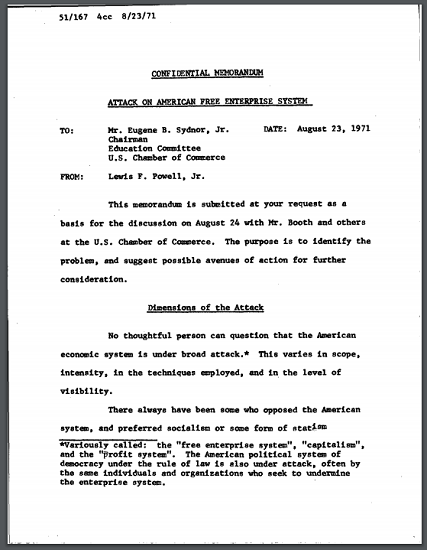| Powell Memorandum (1971)—PDF |
|---|
| www.studenthandouts.com ↣ Texts ↣ Historical Documents |
 |
   |
|
This document, known as the "Powell Memo," was written by Lewis F. Powell, Jr. (a nationally recognized law and business leader who would go on to serve as an associate justice of the United States Supreme Court from December 9, 1971, to June 26, 1967), on August 23, 1971, to Eugene B. Snyder, Jr., then serving as chairperson of the United States Chamber of Commerce's Education Committee. In it, Powell provides his thoughts (requested by the committee) on how the American capitalist system should defend itself from a perceived leftist attack. This memorandum marks the beginning of what some refer to as the "Corporate Proxy Movement" in the late 20th century, during which corporations have pushed elected officials to support legislation favorable to corporate interests. Click here to print. EXCERPT: CONFIDENTIAL MEMORANDUM ATTACK ON THE FREE ENTERPRISE SYSTEM This memorandum is submitted at your request as a basis for the discussion on August 24 with Mr. Booth and others at the U.S. Chamber of Commerce. The purpose is to identify the problem, and suggest possible avenues of action for further consideration. Dimensions of the Attack No thoughtful person can question that the American economic system is under broad attack. This varies in scope, intensity, in the techniques employed, and in the level of visibility. There have always been some who opposed the American system, and preferred socialism or some form of statism (communism or fascism). Also, there always have been critics of the system, whose criticism has been wholesome and constructive so long as the objective was to improve rather than to subvert or destroy. But what now concerns us is quite new in the history of America. We are not dealing with episodic or isolated attacks from a relatively few extremists or even from the minority socialist cadre. Rather, the assault on the enterprise system is broadly based and consistently pursued. It is gaining momentum and converts. Sources of the Attack The sources are varied and diffused. They include, not unexpectedly, the Communists, New Leftists and other revolutionaries who would destroy the entire system, both political and economic. These extremists of the left are far more numerous, better financed, and increasigly are more welcomed and encouraged by other elements of society, than ever before in our history. But they remain a small minority, and are not yet the principal cause for concern. The most disquieting voices joining the chorus of criticism, come from perfectly respectable elements of society: from the college campus, the pulpit, the media, the intellectual and literary journals, the arts and sciences, and from politicians. In most of these groups the movement against the system is participated in only by minorities. Yet, these often are the most articulate, the most vocal, the most prolific in their writing and speaking. ... |
| UNIT I: | Early America | UNIT IX: | Discontent and Reform | ||
| UNIT II: | Colonial Period | UNIT X: | War, Prosperity, and Depression | ||
| UNIT III: | American Revolution | UNIT XI: | New Deal and World War II | ||
| UNIT IV: | New National Government | UNIT XII: | Postwar America | ||
| UNIT V: | Westward Expansion | UNIT XIII: | Decades of Change | ||
| UNIT VI: | Sectional Conflict | UNIT XIV: | New Conservatism | ||
| UNIT VII: | Civil War and Reconstruction | UNIT XV: | Into the Twenty-first Century | ||
| UNIT VIII: | Growth and Transformation | UNIT XVI: | Polarization and Deglobalization |
| www.studenthandouts.com ↣ Texts ↣ Historical Documents |














































